Phones are useful travel tools that can be tempting to thieves. Here's how to keep your phone safe while on holiday and what to do if it does go missing.
Flight etiquette and unsaid rules on planes
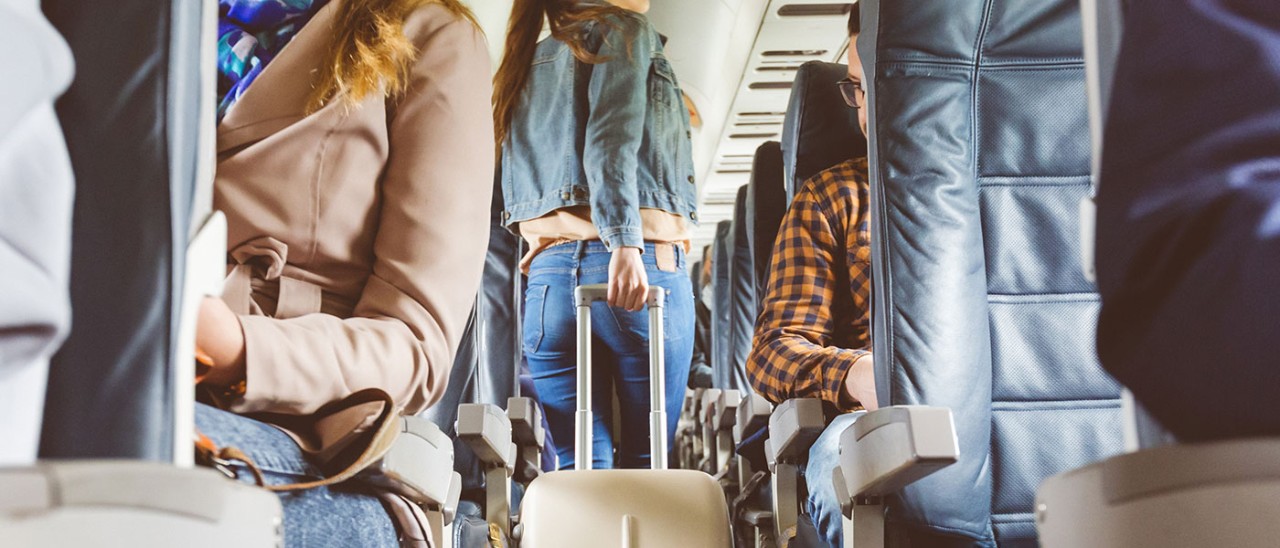
Whether you’re a first-time flyer or seasoned business traveller, flying around Australia or enduring a long-haul flight to Europe, here are the essential dos and don’ts of flight etiquette.
Air travel can be both exciting and stressful, with major airports such as Melbourne International Airport serving millions of passengers every year. With so many people congregating in one place, it’s important to remember that flying is a shared experience that requires patience and courtesy, especially if you face long lines, flight cancellations or even lost luggage.
When travelling by air, and seated near a bunch of strangers, it's critical to show respect to your fellow passengers so that everyone has a good flight experience.
More: How to stop losing your passport and protect it from theft
In this article
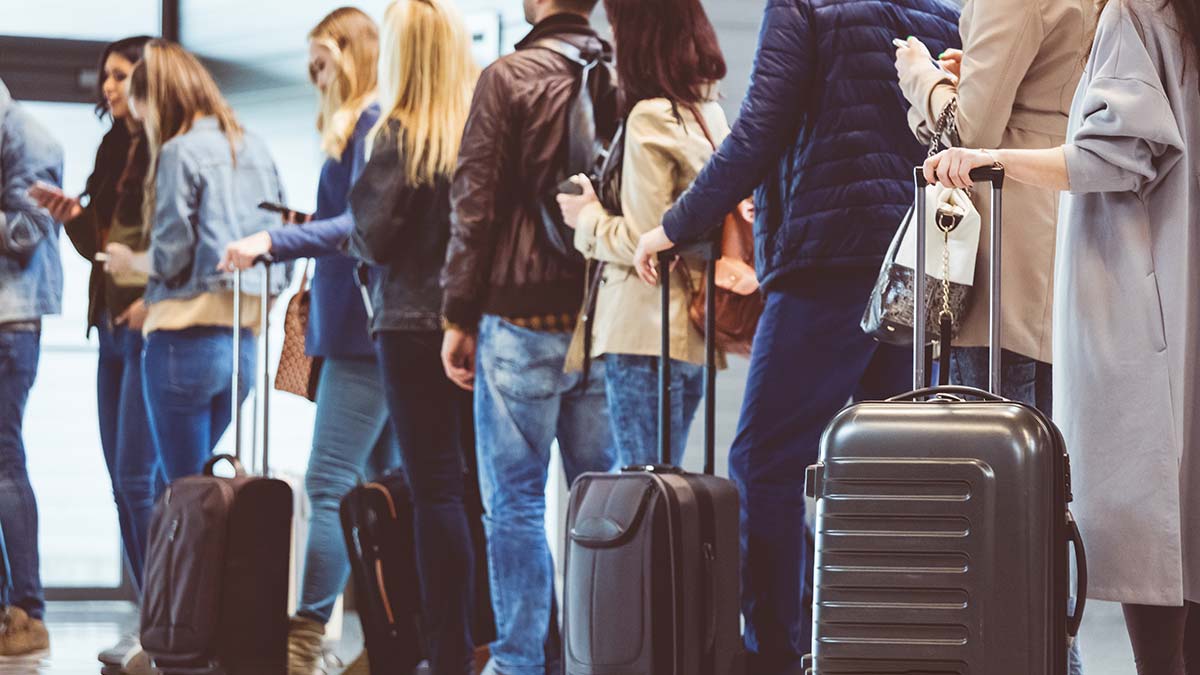
Arriving at the airport early allows for unforeseen delays and helps you stay calm. Image: Getty
Security checks
Arrive early and wear shoes that are easy to slip on and off, remove belts and other items that are likely to set off the alarms and watch what’s happening ahead of you. If passengers are all pulling their laptops and devices out of their bags for screening, try to get yours out ahead of time so you’re not holding up the line when it’s your turn. While some airports may have more modern scanning technology that allows you to keep some items on or in your bag, others still require removal for proper scanning.
Booking and seating
If you ask someone to swap seats and they decline, that is their right. They may have paid a fee for that seat selection or it might be a specific seat they prefer. If a passenger has booked a second seat beside them, you must respect that. It’s generally best to get approval from the cabin crew before moving to an open seat. Sometimes an airline may change where you seat for operational, safety, or security reasons.
More: Driving overseas and International Driving Permit guide
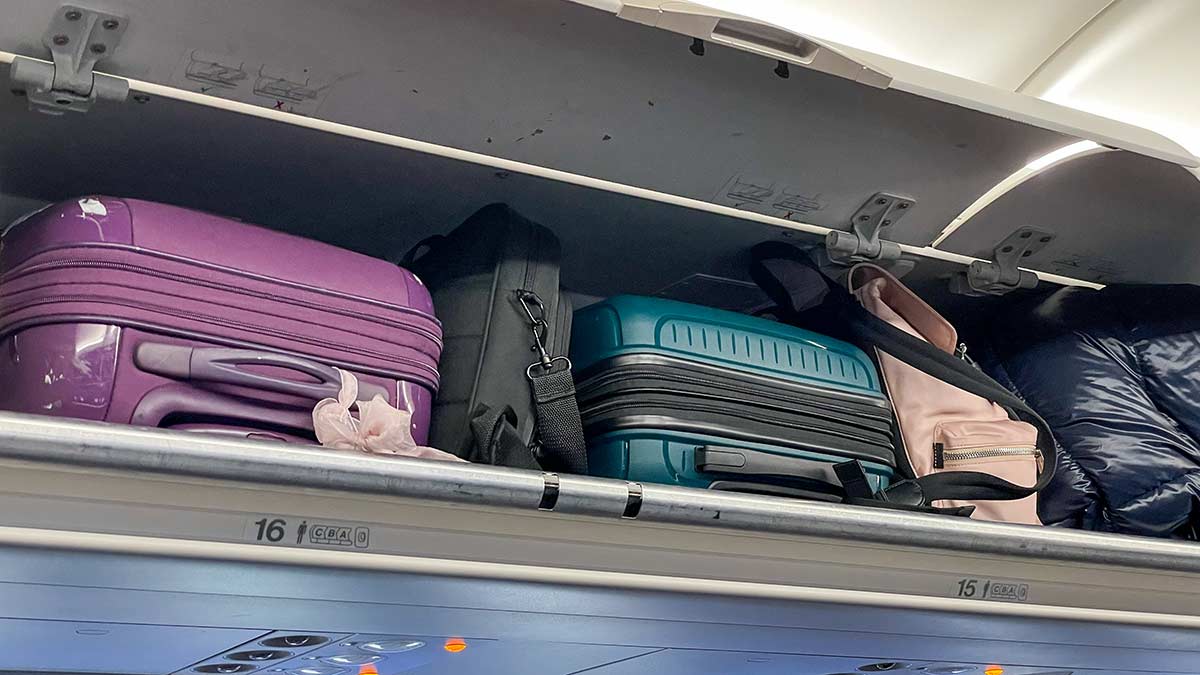
Stick to the weight limits so that there is room for everyone's bags in the overhead bins. Image: Getty
Luggage
Be aware of the airline’s limits. If you have too much luggage, then others won’t be able to fit theirs in overhead bins or under the seat, which negatively impacts their travel experience and can lead to altercations among passengers. Airlines typically have weight limits for carry-on bags, and if you exceed those limits, you may be required to pay an extra fee. Some airlines may also offer the option to check in your carry-on bag if it's overweight.
Boarding groups
Your ticket clearly states which boarding group you’re in. Generally, window seats board first, then the middle and then those in the aisle. It makes sense and, if other passengers have been respectful of the luggage limits, there will be enough space for your bags in the overhead lockers.
More: What happens with lost or stolen luggage at the airport?
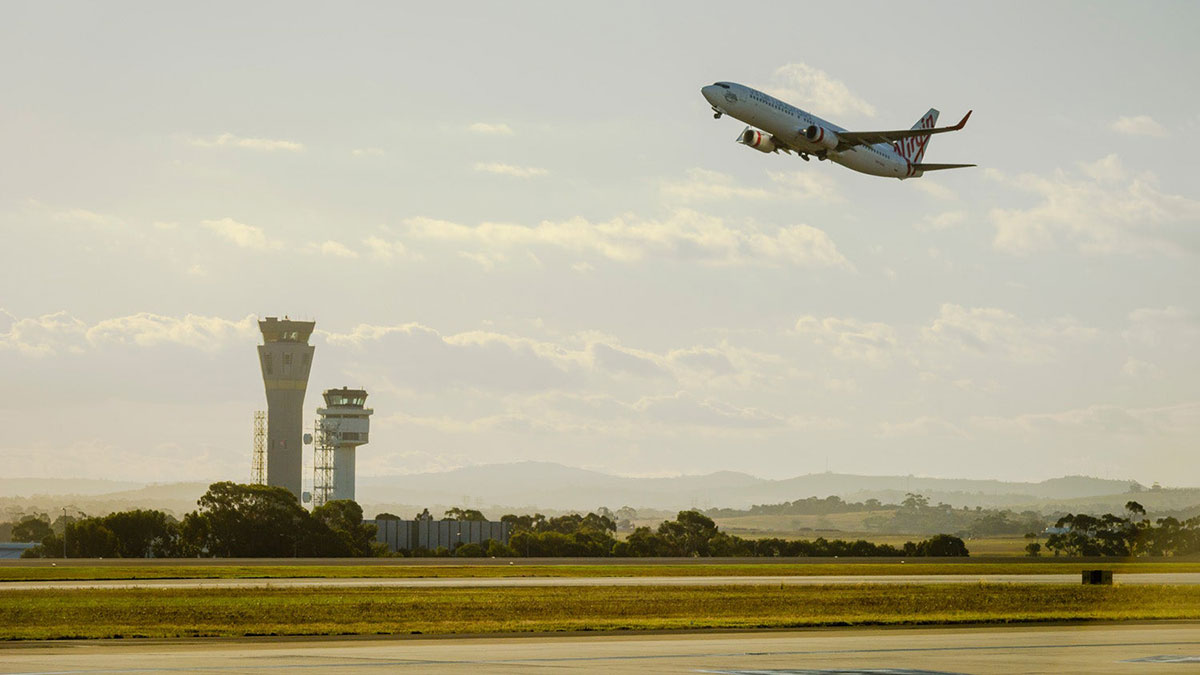
The pressure changes during takeoff (and landing) can adversely affect children and others, so be understanding and empathetic. Image: Melbourne Airport
Armrest and reclining
If you wish to recline your seat on a flight, alerting the passenger behind you is considered polite. Be empathetic if someone reclines, even on a short trip. People have many different comfort requirements when they’re travelling. The armrest battle, however, should never occur. If you have the window seat, you use the armrest near the wall. If you’re in the aisle, you have the aisle armrest. The person in the middle is entitled to both armrests. That’s it.
Noise control
You must bring headphones if you intend to use audio of any kind on your devices. No one wants to hear the chirping of electronic wins of your game or the canned laughter on your favourite TV episode. This rule applies for children too. If your kids are too young to wear headphones, they may be too young to be using devices.
Hygiene
Wearing strong perfume or cologne is a no-no. A plane cabin is an enclosed space and you’re in close quarters with many other humans. Keep it light and subtle. On the topic of body odour, make sure your hygiene is at its best. Shower before a flight and wear deodorant.
More: How travel insurance protects you in medical emergencies
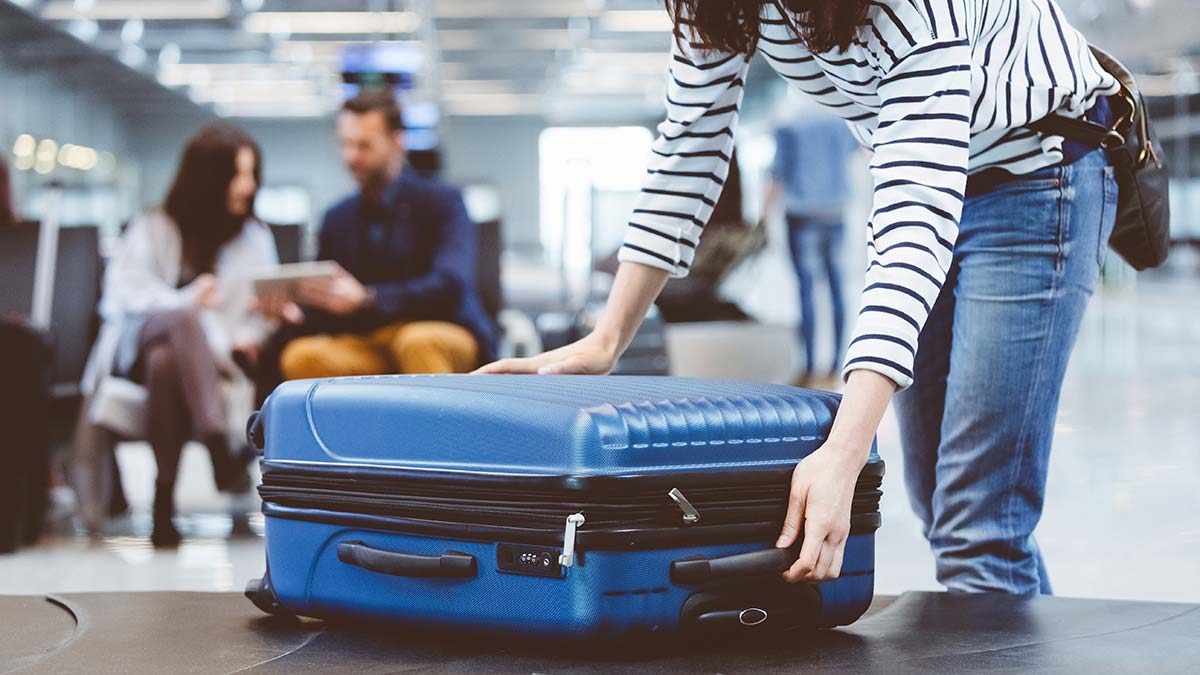
Give other passengers enough space to collect their baggage from the carousel. Image: Getty
Be polite
It’s important to remember that the main responsibility of a flight attendant is to keep passengers safe in the event of an emergency. Treat flight staff respectfully and with an expectation that they are doing their best. As well as providing a comfortable and efficient service, the staff will be staying alert for any potential hazards on board, including turbulence, medical emergencies, and unruly passengers.
Getting off the plane
Passengers file out in rows from the front, and it is a given that you don’t move until everyone in front of you has disembarked. If there are passengers on your plane who need to rush to make a connection, be kind and make space for them. Don’t push ahead when leaving the plane. You’ll probably face a wait for your baggage in the terminal anyway.
Collecting luggage
In some countries, a line is painted about a metre back from the luggage carousel, and people stand behind it until their suitcase appears. The extra space gives everyone the chance to see what’s coming. Be civilised and give others some breathing room.
More: Driving overseas and International Driving Permit guide
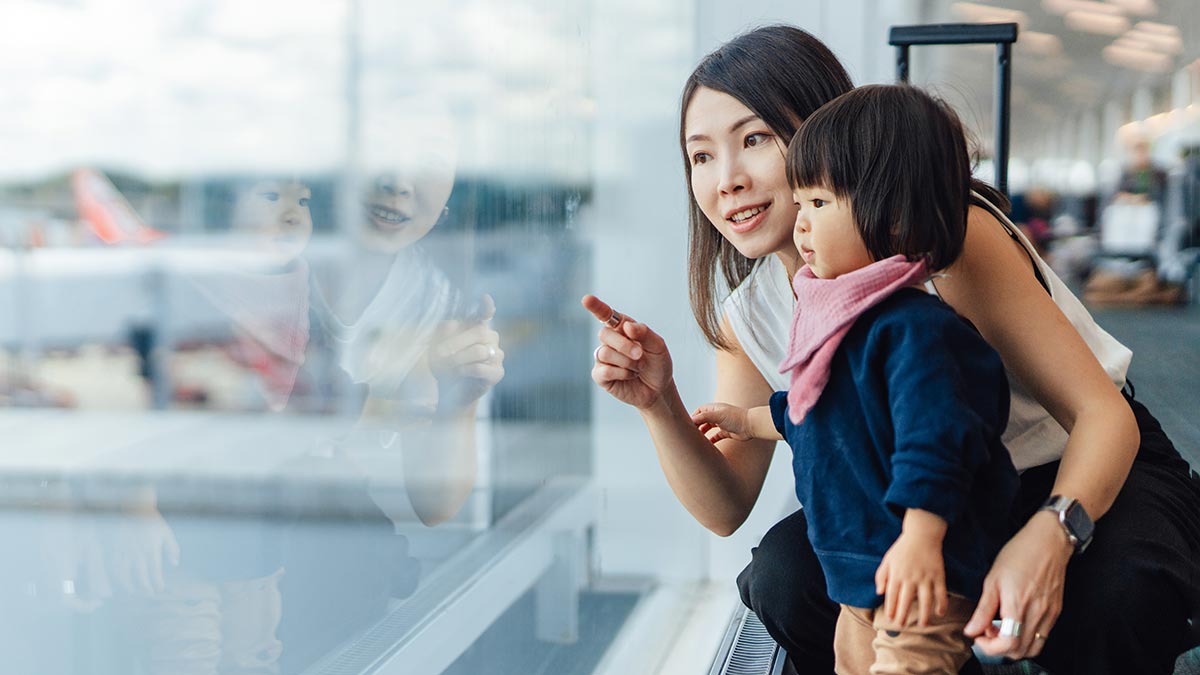
Parents can help children stay calm by bringing along activities and snacks. Image: Getty
Special considerations
Travelling with children
If your child is old enough, talk to them about what happens before, during, and after a flight to help them prepare. Bring along as many activities and snacks as possible to keep them occupied enroute, as well as a change of clothes, and any comfort items like blankets or stuffed animals. Consider booking early flights to align with your child’s natural sleeping patterns.
The pressure inside the cabin changes during takeoff and landing, and it may be beneficial to feed or offer snacks to your child during these times. Other passengers can be prepared with their own noise-cancelling ear plugs and a good movie in mind. Everyone should appreciate that crying is normal for babies and young children and respond with empathy.
Assisting others
If you notice elderly or disabled passengers who need assistance, and you’re able bodied, offer them support. Grab their luggage off the carousel or from an overhead locker, make space for their mobility aids, such as wheelchairs, and allow them to move at their own pace. The same goes for assisting parents of young children.
Having good manners and maintaining this flight etiquette means a smoother, safer journey for everyone. As a responsible traveller, good behaviour is the first thing you can do to ensure that your trip starts and finishes well.
When passengers don’t behave appropriately, it can lead to confrontations, delays and missed connections.
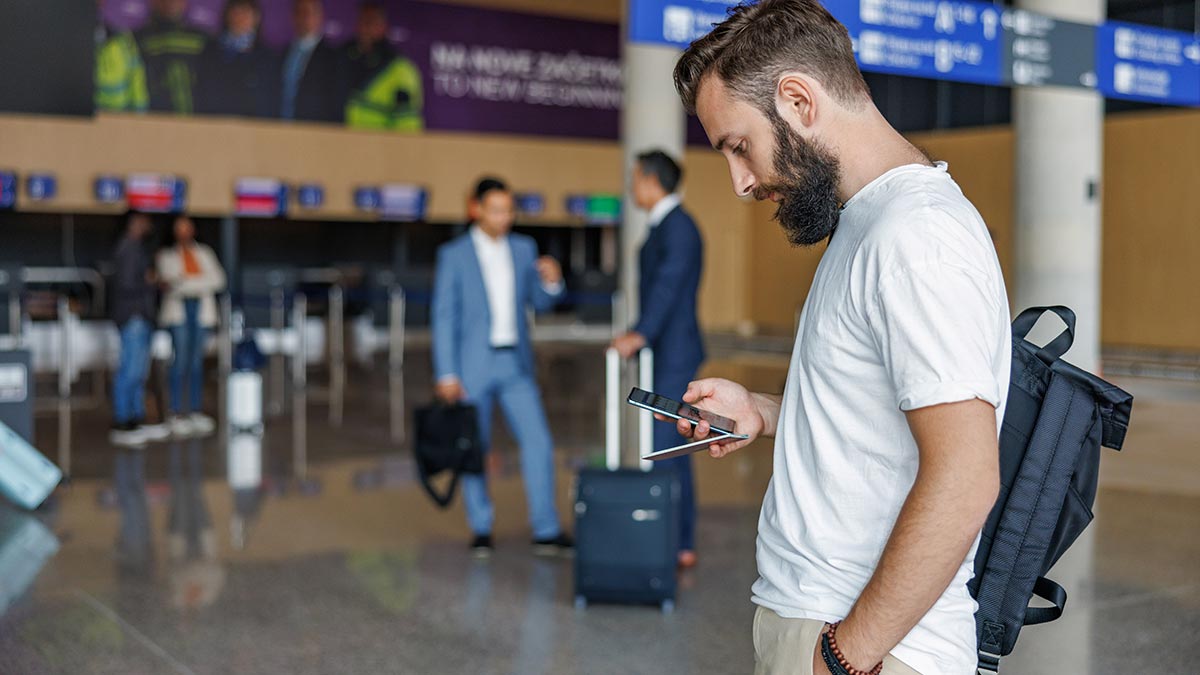
Travel Insurance can provide cover for a range of unexpected events that may affect your trip. Image: Getty
Holidays don't always go according to plan
Travel insurance protects you financially when unexpected events disrupt your trip. Depending on the policy and level of coverage, travel insurance can cover medical emergencies, trip cancellations, delays, lost baggage, or major events such as natural disasters.
Take the time to review the different levels of coverage. Make sure you read the Product Disclosure Statement thoroughly to understand the inclusions and exclusions of your policy, ensuring you choose the best option for your requirements.
The information provided is general advice only. Before making any decisions please consider your own circumstances and the Product Disclosure Statement and Target Market Determinations. For copies, visit racv.com.au. Royal Automobile Club of Victoria (RACV) Ltd AR 001243563 is an authorised representative of the issuer and receives commission for each policy sold or renewed. RACV Travel Insurance issued by Tokio Marine & Nichido Fire Insurance Co., Ltd ABN 80 000 438 291 AFSL 246 548. Terms & conditions apply, refer to the PDS.


